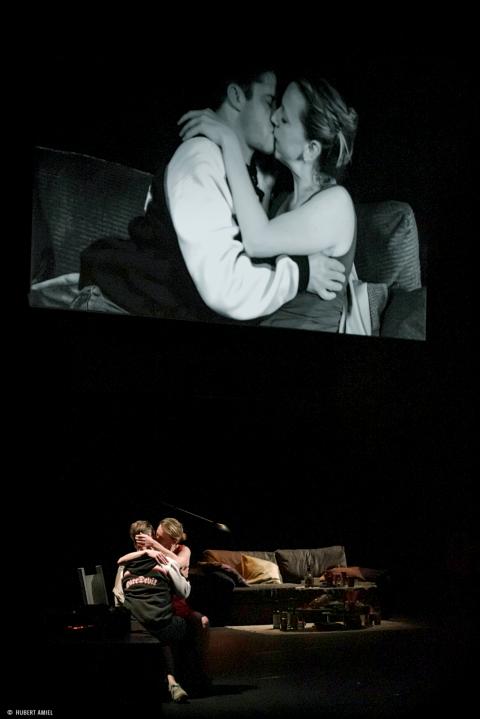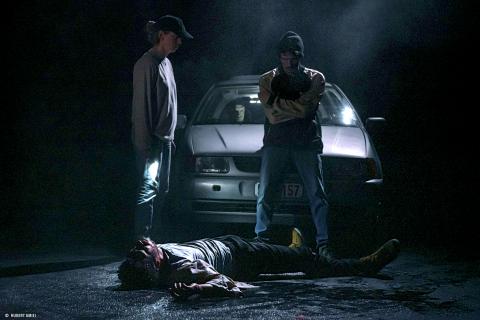Unless you’re a meticulous researcher or watching a Broadway classic, theater-going is a bit of a betting game. You try to decide from a short description whether the play will be worth the money and time. You skip a full dinner or lunch to arrive early, as advised. Then, as the lights dim, after having had your expectations lowered by one too many mediocre performances, you pray today’s will make you feel any emotion other than boredom at least once.
Thankfully, and to my surprise, The Repetition, Swiss director Milo Rau’s first production after last May’s release of his Ghent Manifesto — ten rules informing his company’s theatrical practice — was a good bet. (Full disclosure: I went on a press ticket.)
At first glance, the premise of the five-act play, which ran for three performances last weekend at the National Theater in Taipei, looks like a public relations, and potentially legal, disaster waiting to happen. Based on the homophobic murder of Ihsane Jarfi, a 32-year-old Muslim man, on April 22, 2012 in Liege, Belgium, the play builds up to a reenactment of that heinous crime.

Photo courtesy of the National Performing Arts Center
Treated with less than the utmost care, it would have been controversial at best and traumatizing — for audience members and Jarfi’s family alike — at worst. I suspect the emotional weight of the story, as well as competition from other shows during the Taiwan International Festival of Arts season, was why the show did not play to a full house on opening day.
A projector screen placed center-stage broadcasts close-up interviews with Jarfi’s parents (played by Suzy Cocco and Johan Leysen), one of the murderers, Jeremy Wintgens (played by Fabian Leenders) and Jarfi’s ex-boyfriend (played by Sebastien Foucault). But though it feels eerily like a true crime documentary, The Repetition is not just a reconstruction of the events that led up to and followed the night Jarfi died.
Instead, it also recreates its own production. Before act one even begins, we see the auditions of Cocco, Leenders and Tom Adjibi, who plays Jarfi. The performers are so natural it is as though they are speaking to the casting panel for the first time.

Photo courtesy of the National Performing Arts Center
By approaching the subject from the periphery and then spiraling into the murder around which the play revolves, The Repetition humanizes itself and shares with the audience the intricacies of theatrically representing a real-life tragedy. It addresses, and in so doing begins to heal, the collective trauma of knowing such violence exists.
The show reaches an inevitable death — we know this. But Rau still finds a way in the end (no spoilers, as the show is still touring) to preserve the intensity of the loss of life.
The delicacy with which Rau and his cast guide the audience through a 100-minute meditation on violence turns what began as a deconstruction of theater into a work that even Jarfi’s father, Hassan Jarfi, described as “better than a monument for the dead,” according to NTGent, the theater where Rau serves as artistic director. On stage, and in our memories, Jarfi lives.

On April 26, The Lancet published a letter from two doctors at Taichung-based China Medical University Hospital (CMUH) warning that “Taiwan’s Health Care System is on the Brink of Collapse.” The authors said that “Years of policy inaction and mismanagement of resources have led to the National Health Insurance system operating under unsustainable conditions.” The pushback was immediate. Errors in the paper were quickly identified and publicized, to discredit the authors (the hospital apologized). CNA reported that CMUH said the letter described Taiwan in 2021 as having 62 nurses per 10,000 people, when the correct number was 78 nurses per 10,000

As Donald Trump’s executive order in March led to the shuttering of Voice of America (VOA) — the global broadcaster whose roots date back to the fight against Nazi propaganda — he quickly attracted support from figures not used to aligning themselves with any US administration. Trump had ordered the US Agency for Global Media, the federal agency that funds VOA and other groups promoting independent journalism overseas, to be “eliminated to the maximum extent consistent with applicable law.” The decision suddenly halted programming in 49 languages to more than 425 million people. In Moscow, Margarita Simonyan, the hardline editor-in-chief of the

Six weeks before I embarked on a research mission in Kyoto, I was sitting alone at a bar counter in Melbourne. Next to me, a woman was bragging loudly to a friend: She, too, was heading to Kyoto, I quickly discerned. Except her trip was in four months. And she’d just pulled an all-nighter booking restaurant reservations. As I snooped on the conversation, I broke out in a sweat, panicking because I’d yet to secure a single table. Then I remembered: Eating well in Japan is absolutely not something to lose sleep over. It’s true that the best-known institutions book up faster

Though the total area of Penghu isn’t that large, exploring all of it — including its numerous outlying islands — could easily take a couple of weeks. The most remote township accessible by road from Magong City (馬公市) is Siyu (西嶼鄉), and this place alone deserves at least two days to fully appreciate. Whether it’s beaches, architecture, museums, snacks, sunrises or sunsets that attract you, Siyu has something for everyone. Though only 5km from Magong by sea, no ferry service currently exists and it must be reached by a long circuitous route around the main island of Penghu, with the